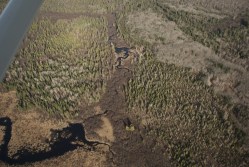A letter to the national Occupy Wall Street Movement, written by a member of Deep Green Resistance Austin, reminding us of a fundamental premise for any movement seeking a brighter future.
from: http://theplanetfeedsus.wordpress.com
an open letter to the national Occupy Wall Street movement
Dearest Occupy ::
I write y’all with the greatest admiration, excitement, hope, and humility.
I write with the intention to contribute to the conversations that people are having nationally – and internationally – about what the building of a just and sustainable world would look like.
I know these conversations have been going on for a very long time – longer than I can imagine – and that they did not begin with this movement and will not end with it, either. I know I’m not the only one with the content of this letter on their mind. I write from Austin, Texas, from occupied Tonkawa and Apache territories, and what I know of the other general assemblies and convergences comes through the Internet. I know I’m not privy to the majority of the conversations being had. But while trying to follow what people are calling for in this movement I’ve yet to see stated clearly what I consider to be a very important piece of the puzzle. Please know that I write this from a place of humility and respect, and in the spirit of dialogue for change.
I do not believe that there is hope for justice or a livable planet if the industrial economy continues. I do not believe any reform or technological innovation we have or could think of – even if realized on a massive, global scale – will prevent the destruction of the planet and the communities that are its breath and life. I believe the keys to deep green democracies and to a sustainable and just future are many – but that none of them are possible so long as industrialism continues. In the face of ecological collapse, global warming, and peak oil, any further growth of the global economy – including the U.S. economy – will only worsen the problem.
I believe that our challenge must not be to create more jobs or to grow the economy – but to physically pull apart the infrastructure of the powerful while creating local economies grounded in livelihoods outside the money system, and to redefine growth and economic prosperity altogether.
I know this is an intense thing to say, but please hear me out.
Many folks are and have been raising the crucial point that we can’t have infinite growth on a finite planet. There are many progressives who do not find this too controversial a statement – for many of us, it’s become a kind of common sense. For many of us, this becomes yet another reason among many why capitalism cannot continue. But there is an unspoken sentiment we continue to share, nonetheless, that while we may not want a capitalist economy, we still want to salvage some sort of an industrial way of life for ourselves. As Derrick Jensen has pointed out, when you begin to listen to the solutions to the ecological crisis being offered by folks across the political spectrum – it becomes clear that almost all of them agree on one thing: the industrial economy must be salvaged at any cost. The primary objective becomes the preservation of industrial civilization – not the preservation of a living, healing planet.
But look deeply into any of the processes that make industrialism possible, look deeply into the origins of any of its luxuries and commodities, and you will find – literally – a trail of blood, and a ceaseless taking away from a planet that simply has almost nothing left to give.
We understand that we are in an ecological crisis.
But do we understand just how late the hour is?
Continue reading →





